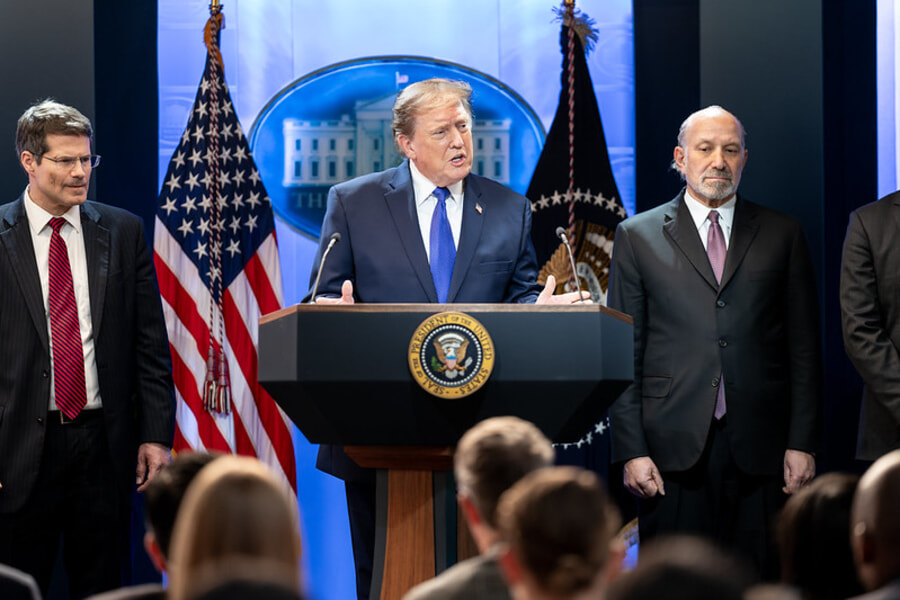Oral Argument Summary: CC/Devas (Mauritius) Ltd. v. Antrix Corp. Ltd.

On March 3, the Supreme Court heard oral argument in CC/Devas (Mauritius) Ltd. v. Antrix Corp. Ltd., a case with significant ramifications for foreign governments litigating in the United States. The case stems from a dispute between an American-backed satellite company and the commercial arm of India’s Department of Space. It raises the question of whether foreign governments, which enjoy immunity from suit subject to the enumerated exceptions in the Foreign Sovereign Immunities Act (FSIA), must have some connection to the United States before a U.S. court may exercise personal jurisdiction over them for the purposes of enforcing an arbitral award. What follows is a summary of the case and the parties’ arguments in anticipation of the Court’s forthcoming decision.
Background
This case arrived at the Supreme Court after more than a decade of litigation spanning tribunals around the world. The dispute dates back to a 2005 contract in which Antrix, the commercial arm of the government of India’s space agency, agreed to provide two satellites to satellite company Devas and lease S-band electromagnetic spectrum for their operation. In 2011, the Indian government decided it wanted to retain that spectrum for itself and thus instructed Antrix to cancel its contract with Devas. Pursuant to the arbitration clause in their contract, Devas commenced arbitration and was awarded more than $500 million dollars plus interest.
Following the arbitration, Devas sought to enforce the award against Antrix’s assets. It filed to confirm the award in the U.S. District Court for the Western District of Washington, where Antrix argued that Devas was required to prove that Antrix had minimum contacts with the United States before the court could assert personal jurisdiction over it. The district court held that a showing of minimum contacts was not required. Antrix appealed this ruling to the U.S. Court of Appeals for the Ninth Circuit.
While the appeal in the Ninth Circuit was pending, Antrix asked an Indian corporate-law tribunal to set aside the arbitral award on the basis that the underlying contract between Antrix and Devas had been procured through fraud. The Indian tribunal, whose opinion was affirmed by the Supreme Court of India on appeal, agreed that the contract had been procured through fraud and appointed a liquidator to seize control of Devas. When the liquidator fired Devas’s counsel in the district court and the Ninth Circuit—presumably intending to avoid enforcement of the award against Antrix—two of Devas’s shareholders and its U.S. subsidiary intervened on the part of Devas.
Over the opposition of the liquidator and Antrix, Devas was permitted to conduct post-judgment discovery, which revealed a claim that Antrix held in a bankruptcy proceeding in the Eastern District of Virginia. Devas moved to register its judgment against Antrix in Virginia and garnish the bankruptcy claim. The district court in Virginia allowed Devas to register its judgment and Antrix appealed, again arguing that the court lacked personal jurisdiction because Devas had failed to establish that Antrix had minimum contacts with the United States.
Both the Washington and Virginia appeals were consolidated and heard by the Ninth Circuit. The Ninth Circuit reversed the district court decisions and held that Devas was required to show that Antrix had minimum contacts with the United States. It relied primarily on the court’s own precedent in Thomas P. Gonzalez Corp. v. Consejo Nacional De Produccion De Costa Rica, in which it held that “the legislative history of the [FSIA] confirms that the reach of [FSIA’s grant of personal jurisdiction] does not extend beyond the limits set by the International Shoe line of cases.” After it was denied a rehearing en banc, Antrix appealed the judgment of the Ninth Circuit and the Supreme Court granted certiorari to hear the case.
International Arbitration and the Foreign Sovereign Immunities Act
To understand the stakes of CC/Devas (Mauritius) Ltd. v. Antrix Corp. Ltd., it is important to grasp the robust system of international arbitration, award enforcement, and sovereign immunity out of which the dispute arose. International arbitration is firmly established as the preferred method of dispute resolution in cross-border transactions, as it offers the parties confidentiality, flexible procedures, the avoidance of any home-court advantage, and the ability to appoint arbitrators with subject matter expertise. However, while an arbitral tribunal may issue a judgment—called an “award”—to the successful party in an arbitration, that party must typically turn to domestic courts in order to enforce that award against the assets of the losing party.
A number of international treaties, free trade agreements, and bilateral investment treaties govern the enforcement of arbitral awards in domestic courts. The most important of these for private parties is the New York Convention. Opened for signature in 1958, it currently boasts 169 signatory states, including the United States and India. It provides that any valid award issued by an arbitral tribunal will be enforceable in the domestic courts of the signatory state as if it were a judgment issued by a domestic court. Under the New York Convention, award holders frequently seek out jurisdictions where their opposing party may have assets and then bring an action in a domestic court in that jurisdiction to enforce their arbitral award against those assets.
Under the New York Convention, those holding awards can enforce them in the United States. But a court must first have personal jurisdiction over a party before asserting its authority over them. This requirement of personal jurisdiction comes from the Due Process Clauses of the 14th Amendment (in state law cases) and the Fifth Amendment (in federal law cases). In the seminal case of International Shoe v. Washington, the Supreme Court held that the Due Process Clause requires that a defendant must have “minimum contacts” with a forum before a court can assert personal jurisdiction over that defendant. Thus, courts have generally required that award debtors have some connection to the United States before entertaining an action to enforce an arbitral award against them.
This system of arbitration and enforcement becomes more complex, however, when the opposing party is a sovereign state or state-owned entity. Under international law, foreign sovereigns are immune from suit in the courts of another sovereign state except in certain limited circumstances. In 1978, Congress codified these immunities by enacting the FSIA but—consistent with the “restrictive theory” of sovereign immunity under international law—also installed several exceptions to immunity, including for purely commercial activity, state-sponsored terrorism, admiralty claims, and, relevant to this case, to enforce arbitration awards.
The FSIA also provides that “[p]ersonal jurisdiction over a foreign state shall exist as to every claim [covered by an immunity exception] where service has been made [pursuant to the FSIA’s service provisions].” A plain reading of this provision might suggest that as long as one of the FSIA’s exceptions to immunity has been met and service of process has been effected, the normal requirement that a defendant have “minimum contacts” with the United States for the exercise of personal jurisdiction does not apply. The respondents in CC/Devas (Mauritius) Ltd. v. Antrix Corp. Ltd. have argued, however, that despite the language in the FSIA, the normal requirement of “minimum contacts” still applies. The question before the Supreme Court then is whether a judgment creditor must prove that the foreign sovereign has minimum contacts with the United States before a court can assert personal jurisdiction to enforce an arbitral award.
Parties’ Arguments
The question presented to the Court has two prongs. The first is whether the FSIA itself imposes a minimum contacts requirement as a prerequisite to personal jurisdiction over foreign sovereigns. The second prong is whether, independent of the FSIA, the Fifth Amendment’s Due Process Clause imposes a minimum contacts requirement. As to the first prong, Devas points out that under the terms of the FSIA, in order to have personal jurisdiction over a foreign sovereign a plaintiff need only show (a) that an exception to sovereign immunity is met and (b) that the defendant has been served in accordance with the procedures set out in the statute. Beyond these requirements, they argue, nothing in the statute imposes a minimum contacts requirement.
Devas further argues that the precedent on which the Ninth Circuit relied in its holding requiring foreign sovereigns to have minimum contacts itself rested on an erroneous interpretation of a single piece of legislative history from the FSIA’s enactment. That legislative history, Devas argues, instead merely suggests that while some exceptions in the FSIA require a connection to the United States for purposes of subject matter jurisdiction (for example, under the terrorism exception, the plaintiff must be a U.S. citizen), there is no blanket requirement that foreign sovereigns have minimum contacts with the United States.
In response, Antrix argues that when Congress drafted the FSIA exceptions, it intended to require meaningful contacts with the United States to establish jurisdiction. It points to the various other immunity exceptions within the FSIA, each of which requires some connection to the United States. Antrix also notes that the FSIA was meant to replace the prior system of case-by-case immunity determinations made by the secretary of state by ensuring that immunity determinations are made on purely legal grounds and under procedures that ensure due process. The FSIA’s arbitration exception too, Antrix argues, is by its terms limited only to matters that would be “arbitrable under U.S. law.” Antrix points out that the Federal Arbitration Act (FAA) governs what types of claims are arbitrable under U.S. law, and under that statute only contracts that deal with “commerce among the several states or with foreign nations” are arbitrable. Antrix argues that because the underlying contract is between two Indian corporations, and provides for performance in India, it lacks the requisite U.S. nexus for arbitrability under the FAA and thus also fails to meet the requirements of the FSIA’s arbitration exception.
As to the second prong of the case, whether the Fifth Amendment independently requires a showing of minimum contacts, Devas argues that foreign sovereigns are not “persons” as the word is used in the Fifth Amendment and therefore are not guaranteed its protections. It relies principally on South Carolina v. Katzenbach, in which the Supreme Court held that states of the union are not “persons” for purposes of the Fifth Amendment. They argue that this rationale should be extended to foreign sovereigns, as providing foreign sovereigns greater due process protections than domestic states makes little sense. In Republic of Argentina v. Weltover, the Supreme Court “assum[ed] without deciding” that foreign sovereigns were persons for purposes of the Due Process Clauses but noted its holding in Katzenbach that the contrary was true for states of the union. Devas argues that the Court’s recognition of its holding in Katzenbach in its Weltover opinion indicates that foreign sovereigns are in fact not considered “persons” for purposes of the Due Process Clause. Additionally, Devas argues that because foreign sovereigns were completely immune from suit in the United States at the time of the founding, it is highly unlikely that the drafters of the Constitution intended that the word “persons” in the Fifth Amendment encompass foreign sovereigns.
Antrix responds by disputing the assumption that it should be equated with its sovereign owner for purposes of determining whether it is a “person” covered by the Fifth Amendment. Antrix points out that it is well established that the Due Process Clause applies to foreign corporations. Additionally, the identity of a corporation is generally held to be separate from the identity of its shareholders. Thus, the fact that India is a majority shareholder in Antrix, the company argues, is irrelevant to whether or not it is entitled to the protections of the Due Process Clause.
However, even if Antrix is equated with its sovereign ownership and treated as an extension of the government of India, Antrix presents evidence suggesting that the drafters of the Constitution did in fact intend for the term “persons” in the Fifth Amendment to include foreign sovereigns. Specifically, Antrix highlights evidence that the Fifth Amendment’s framers deliberately replaced the term “Freemen” with the broader term “person,” thereby encompassing foreign states. Ingrid Wuerth, in her amicus brief, echoes this contention, pointing out that sources contemporary to the drafting of the Constitution consistently use the term “person” to include sovereign states.
Devas next argues that, even if foreign sovereigns are “persons” entitled to Fifth Amendment Due Process Clause protections, the FSIA provides them all “process” that is “due.” Devas points out that while the minimum contacts test established in International Shoe v. Washington was grounded in the interstate federalism concerns surrounding the territorial limits on the authority of domestic states, no such concerns are implicated in the case of a foreign sovereign. Rather, the process due to foreign sovereigns is a matter entirely within the political branches’ exclusive power to conduct foreign relations. Because foreign relations are the exclusive domain of Congress and the president, Devas argues, the Court should refrain from imposing a minimum contacts requirement not found within the FSIA, nor read one into the Fifth Amendment.
It’s possible, however, the Supreme Court will not reach the constitutional question at all. The Ninth Circuit opinion on appeal purported to rest its holding on purely statutory grounds, and, for this reason, the former solicitor general in her amicus brief argued that the constitutional question should be remanded to the lower courts to decide in the first instance. Devas, however, points out that Antrix raised this argument below and the precedent on which the Ninth Circuit relied in reaching its holding rested on constitutional grounds. Therefore, Devas argues, the constitutional question is ripe for decision. In his amicus brief, Paul Stephan argues that because the Ninth Circuit rested their opinion on statutory grounds—and those statutory grounds were correct—remand is unnecessary and the Court can affirm the Ninth Circuit on statutory grounds alone.
Yet another way the Supreme Court could avoid the constitutional question is by holding that personal jurisdiction is proper, not because Antrix has minimum contacts with the U.S., but because it has given its “consent” to suit via India’s ratification of the New York Convention. Mark Feldman, one of the principal drafters of the FSIA’s arbitration exception, argued in his amicus brief that when Congress enacted the FSIA’s arbitration exception, it understood that when sovereign states ratify the New York Convention and other treaties, they give their consent to be sued in the courts of other signatory states for the enforcement of arbitral awards. This consent, Feldman argues, is a valid basis for the assertion of personal jurisdiction. Antrix rejects the notion that signing an arbitration agreement with Devas, even though such arbitration would be subject to the New York Convention, constitutes consent to be sued in the United States.
Antrix also argues that if the Court declines to agree with it on both its statutory and its constitutional arguments, it should still rule in favor of Antrix based on two additional theories. The first is that, because the Supreme Court of India—having found that the underlying contract was procured by fraud—set aside the arbitral award, it no longer exists and therefore there is no judgment to enforce. The second theory is that the Court should dismiss the case on the ground of forum non conveniens—a doctrine that says that in a case where a court could exercise jurisdiction, it may still decline to do so if the case is better heard in a jurisdiction to which it is more directly related. In this case, Antrix argues that the most appropriate jurisdiction for resolution of this dispute is India.
Oral Argument
The Supreme Court heard oral argument on March 3. Representing Devas, Aaron Streett of Baker Botts argued the FSIA’s arbitration exception does not require minimum contacts for personal jurisdiction. He argued Congress enacted the arbitration exception to enforce New York Convention arbitration awards against foreign sovereigns and deliberately chose not to include a requirement for a nexus to U.S. commerce. Streett emphasized that Antrix had previously conceded the arbitration exception applied, making its new argument on subject matter jurisdiction both waived and meritless.
Streett also addressed constitutional concerns, arguing that foreign sovereigns are not “persons” under the Due Process Clause and thus do not benefit from Fifth Amendment protections, including a minimum contacts requirement. He pointed out that every circuit post-Weltover has rejected the notion that foreign states have due process rights. Even if due process applied, he argued, Antrix had consented to jurisdiction by agreeing to arbitrate under the New York Convention. Justice Ketanji Brown Jackson questioned whether the personal-jurisdiction-by-consent argument was waived or whether the Court had a duty to consider it since it related to subject matter jurisdiction. Streett responded that FSIA’s structure treats sovereign immunity as a waivable defense and that Antrix’s explicit concession in lower courts meant the issue was not properly before the Court.
Representing Antrix, Carter Phillips of Sidley Austin argued that the FSIA’s arbitration exception implicitly requires a U.S. commercial nexus. He pointed to the structure of the FSIA, arguing that Congress knew how to require a U.S. connection in other exceptions but did not do so explicitly in the arbitration exception. He further argued that enforcement of an arbitration award with no ties to the U.S. exceeds the intended reach of FSIA and the Federal Arbitration Act.
Phillips also addressed the constitutional issue, asserting that Antrix, as a state-owned entity, is entitled to due process protections under the Fifth Amendment. He claimed that foreign corporations have historically been recognized as “persons” for due process purposes and, therefore, should not be subjected to U.S. jurisdiction without minimum contacts. He suggested that if the Court did not resolve this issue, it would likely return to them in the future. Justice Neil Gorsuch questioned whether Antrix’s position was inconsistent since it had previously conceded that the arbitration exception applied. Justices Elena Kagan and Jackson pressed Phillips on why the Court should not simply remand the case to the Ninth Circuit to rule on the constitutional argument in the first instance, given that it was not addressed below. Phillips insisted that subject matter jurisdiction is not waivable and, thus, the Court should resolve it now rather than remanding.
Representing the United States as amicus curiae, Acting Solicitor General Sarah Harris supported Devas’s position, arguing that Antrix has waived its sovereign immunity under the FSIA. Justice Gorsuch questioned whether the Fifth Amendment ever requires minimum contacts without an independent statutory requirement.. Harris responded that the U.S. government’s position in Fuld v. Palestinian Liberation Organization (a related case) is that the Fifth Amendment does not impose a minimum contacts requirement similar to the 14th Amendment, particularly in foreign affairs matters.
The Court appeared inclined to reject the Ninth Circuit’s holding that FSIA requires minimum contacts. However, the debate over whether to resolve the constitutional question or remand for further proceedings appeared to be a point of disagreement among the justices. The justices also grappled with the implications of Antrix’s waiver of the arbitration exception argument and what such a waiver means for the application of the Due Process Clause to foreign sovereigns.
***
The outcome of the case is significant for the system of international arbitration on which much global commerce relies for dispute resolution. Should the Supreme Court hold that a foreign sovereign must have minimum contacts with the United States before a court can assert personal jurisdiction over it, it will make enforcement significantly more challenging for award creditors seeking to enforce their awards in the United States. Such a holding may also conflict with U.S. obligations under the New York Convention and other treaties, which make no mention of personal jurisdiction but require only that arbitral awards be enforced as though they were a judgment from a domestic court. A holding that minimum contacts is a prerequisite to award enforcement could force award creditors to seek enforcement in other jurisdictions. However, if there are no other New York Convention jurisdictions where the foreign sovereign has significant assets, award creditors may be out of luck.
The case could also have ramifications beyond the world of international arbitration. This term, the Court will also hear arguments in Fuld v. Palestinian Liberation Organization, which raises the question of whether Congress can unilaterally declare via statute that a foreign government consents to personal jurisdiction in the United States. In that case, American victims of attacks by the Palestinian Liberation Organization (PLO) sued the PLO under the Promoting Security and Justice for Victims of Terrorism Act (PSJVTA). Passed by Congress in 2019, the PSJVTA provides that the PLO and the Palestinian Authority are “deemed to have consented to personal jurisdiction” for actions brought under the Anti-Terrorism Act of 1992, a law that allows U.S. citizens to sue for injuries sustained from acts of international terrorism. The PLO has argued that the unilateral assertion of personal jurisdiction in the PSJVTA violates the due process protections of the Fifth Amendment.
Both Fuld and CC/Devas (Mauritius) Ltd. then raise the question of whether consent is a valid basis for the assertion of personal jurisdiction, absent a showing of minimum contacts. Notably, in related award enforcement proceedings brought by Devas, courts in both Australia and Canada have held that India’s ratification of the New York Convention sufficed to waive its sovereign immunity, thus subjecting Antrix to the courts’ jurisdiction. The second highest court in the United Kingdom also recently held that ratification of a related international treaty dealing with judgment recognition constituted a waiver of sovereign immunity. The Supreme Court has also seemed receptive to the idea of consent as a basis for jurisdiction. In 2023, in Mallory v. Norfolk Southern Railway Co. the Court held that Pennsylvania could require that out-of-state companies consent to personal jurisdiction as a condition of doing business in the state and that such consent satisfied due process. In CC/Devas (Mauritius) Ltd., the Court may continue its pro-consent trend and find that countries that have signed the New York Convention have given their consent to the assertion of personal jurisdiction over them by U.S. courts. If the Court does take such an approach, it would represent a significant development in the doctrine of personal jurisdiction.
No matter the outcome of the case, CC/Devas (Mauritius) Ltd. v. Antrix Corp. Ltd. will no doubt be closely watched by international arbitration practitioners and foreign state officials alike.




-2.jpg?sfvrsn=f979c73d_6)
